Six prominent people, including a legendary radio broadcaster and the first woman president of the country’s fourth oldest university, will receive honorary degrees during the 146th Commencement ceremony May 18.
The University also will bestow academic degrees on more than 2,300 students during the ceremony, which begins at 8:30 a.m. in Brookings Quadrangle.
Tim Russert, managing editor and moderator of NBC’s “Meet the Press” and political analyst for “NBC Nightly News” and the “Today” show, will deliver the Commencement address and receive an honorary doctor of humane letters degree.
The other honorary degree recipients and their degrees are:
• David C. Farrell, former chairman and chief executive officer of the May Department Stores Co., doctor of science
• Henry Givens Jr., Ph.D., president of Harris-Stowe State University, doctor of humanities
• Paul Harvey, ABC News broadcaster, doctor of journalism
• William S. Sly, M.D., the Alice A. Doisy Professor and chairman of the Edward A. Doisy Department of Biochemistry and Molecular Biology and the James B. and Joan C. Peter Endowed Chair in Biochemistry and Molecular Biology at Saint Louis University, doctor of science
• Shirley M. Tilghman, Ph.D., president of Princeton University, doctor of science
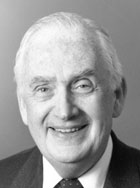
Farrell began his career at Kaufmann’s department store, which was part of the May Department Stores Co., and worked his way up to become chairman and chief executive officer of May.
One of the nation’s most successful retail executives, Farrell retired in 1998 after 20 years at the helm of May. Under his leadership, May grew to become one of the largest and most profitable department store companies in the country.
During his tenure, Farrell oversaw one of the largest mergers of retailing companies of the decade when May acquired Associated Dry Goods Corp. in an exchange of stock roughly valued at $2.7 billion. As a result, May grew to include 303 department, specialty and discount stores.
Since retiring, Farrell has devoted much of his time and resources to supporting the greater St. Louis community, including the University.
In 2000, Farrell and his wife, Betty, in partnership with the former May Co., established the David C. and Betty Farrell Distinguished Professorship in Medicine in the Department of Medicine. Stuart A. Kornfeld, M.D., currently holds the professorship.
The Farrells also provided the leadership gift to build the state-of-the-art Farrell Learning and Teaching Center on the Medical Campus.
A trustee emeritus of the University’s Board of Trustees, he serves as chairman of the Danforth Circle Eliot Society, for which he and his wife are Life Patrons.
He also serves on the Community Advisory Board of Siteman Cancer Center, is on the School of Medicine National Council and is a member of the school’s medical finance committee.
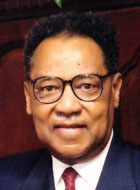
When Givens took over as president of Harris-Stowe State College in 1979, it offered one degree program — in teacher education — and had one building on its midtown St. Louis campus.
Today, it is no longer a college, but a university offering 12 degree programs and boasting six buildings.
Under Givens’ leadership, Harris-Stowe State University not only has greatly expanded its degree programs in selected applied professional disciplines and significantly increased its facilities, but it also has opened its first business school satellite campus in south St. Louis, constructed its first student residence hall and student center and tripled its student enrollment.
A native St. Louisan, Givens earned a bachelor of science degree in education at Lincoln University in Jefferson City, Mo.; a master’s degree in school administration at the University of Illinois; and a doctorate in urban school administration at Saint Louis University. He pursued post-doctoral studies in higher-education administration at Harvard University.
Under his leadership, legislation was passed overwhelmingly in 1993 by the Missouri General Assembly to expand Harris-Stowe’s mission — something that had not been accomplished during the previous 135 years.
In addition to its traditional excellence in teacher preparation, the university today offers an increasing number of new baccalaureate degree programs, including business administration, secondary teacher education, criminal justice, health-care management, accounting, hospitality/tourism management, and information sciences and computer technology.
Givens ultimately was instrumental in Harris-Stowe’s obtaining university status from the state on Aug. 25, 2005. He has received more than 125 national, state and local awards and recognitions for his leadership and service.

With an estimated 25 million listeners and a career that spans nearly 75 years, Harvey is the most recognizable voice on radio.
His two programs, “Paul Harvey News and Comment,” now in its 56th year, and “The Rest of The Story,” now in its 31st year, can be heard on more than 1,200 radio stations as well as 400 Armed Forces Network stations.
Born in 1918 in Tulsa, Okla., Harvey began working at KVOO-AM as a high school student and became an announcer and program director there while attending the University of Tulsa.
After graduation, he worked in Kansas, Oklahoma and St. Louis, where he met and married WUSTL alumna Lynne “Angel” Cooper, who became his producer and business partner.
Angel, who earned both a bachelor’s and master’s degree in English in Arts & Sciences, received an honorary doctor of humanities degree from WUSTL in 1998.
Following a stint in the Army Air Corps, Harvey joined WENR-AM in Chicago, which debuted his “Paul Harvey News.” In 1951, the ABC Radio Networks began broadcasting “News and Comment” on stations coast to coast.
In 1976, ABC Radio expanded “The Rest of the Story” — a long-running feature on “News and Comment” — into its own broadcast. The four-minute segments delve into the forgotten or little-known facts behind stories of famous people and events.
Harvey’s numerous honors include an unprecedented five Marconi Radio Awards — the industry’s highest honor. He was inducted into the National Radio Hall of Fame in 1990. In 2005, he received the Presidential Medal of Freedom, the nation’s most prestigious civilian honor.
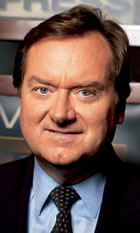
Russert, who joined NBC News in 1984, has interviewed every major figure on the American political scene as well as numerous world leaders and other newsmakers.
Russert also anchors “The Tim Russert Show,” a weekly interview program on CNBC, acts as a contributing anchor for MSNBC and is senior vice president and Washington bureau chief of NBC News.
Since Russert took the helm of “Meet the Press” in December 1991, the show has become the country’s most watched Sunday morning interview program and, according to NBC, the most quoted news program in the world. Now in its 60th year, “Meet the Press” is the longest-running program on television.
The Washingtonian magazine has described Russert as the “best and most influential journalist” in Washington and “Meet the Press” as “the most interesting and important hour on television.”
No stranger to the Washington University campus, Russert covered the three presidential debates the University has hosted since 1992.
He is the author of two New York Times No. 1 best sellers: “Big Russ and Me: Father and Son: Lessons of Life” (2004) and “Wisdom of Our Fathers: Lessons and Letters from Daughters and Sons” (2006).
Russert, who has received numerous awards, including an Emmy in 2005 for his role in President Reagan’s funeral coverage, was inducted into the Broadcasting & Cable Hall of Fame in 2006. He is a trustee of the Freedom Forum’s Newseum and on the board of directors of the Boys & Girls Clubs of Greater Washington and America’s Promise – The Alliance for Youth.
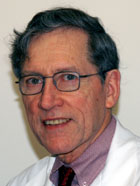
An internationally renowned physician and scientist, Sly has contributed greatly to the understanding of inborn errors of metabolism. These inherited disorders cause biological substances to collect within tissues and organs, interfering with normal function. Sly has uncovered the genetic and biochemical foundations of several rare, yet devastating diseases and helped introduce promising new treatment options.
Sly did his undergraduate work at Saint Louis University and earned a medical degree from its School of Medicine in 1957.
He trained in internal medicine at WUSTL’s medical school and received research training in laboratories at the National Institutes of Health, the Centre National de la Recherche Scientifique in Paris and at the University of Wisconsin before joining the medical school faculty in 1964, where directed the Division of Medical Genetics for 20 years.
Sly was appointed the Alice A. Doisy Professor and chairman of the Edward A. Doisy Department of Biochemistry and Molecular Biology at Saint Louis University in 1984. In February 2007, he also was named the inaugural holder of the James B. and Joan C. Peter Endowed Chair in Biochemistry and Molecular Biology.
In 1973, Sly and his research group described the first patient with mucopolysaccharidosis VII, later termed Sly syndrome. This research provided the rationale for enzyme replacement therapy in Gaucher’s disease, the most common lysosomal storage disease, and has encouraged the development of enzyme replacement for other lysosomal diseases. Sly’s work on lysosomal storage disorders led to his election to the National Academy of Sciences in 1989.
Sly also identified the first inherited deficiency of a human carbonic anhydrase and characterized the associated bone, brain and kidney disease. In addition, he has conducted extensive research on hereditary hemochromatosis.
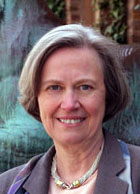
Tilghman is widely recognized as an exceptional teacher and world-renowned scholar in the field of molecular biology. On May 5, 2001, Tilghman was elected Princeton University’s 19th president and assumed office on June 15, 2001.
Tilghman, who had been on the Princeton faculty for 15 years before being named president, is renowned for her pioneering research in mammalian developmental genetics, her national leadership on behalf of women in science and her efforts to make the early careers of young scientists as meaningful and productive as possible.
She was a member of the National Research Council’s committee that set the blueprint for the U.S. effort in the Human Genome Project, as well as one of the founding members of the National Advisory Council of the Human Genome Project Initiative for the National Institutes of Health.
From 1993-2000, Tilghman chaired Princeton’s Council on Science and Technology, which encourages teaching science and technology to students outside the sciences. In 1996, she received Princeton’s President’s Award for Distinguished Teaching.
As Princeton’s president, she oversees the nation’s fourth oldest institution of higher education. Under her leadership, Princeton has pursued a number of important initiatives, including the creation of a four-year residential college system, a major expansion of its commitment to the creative and performing arts and the establishment of a new institute in the cutting-edge field of neuroscience.
A member of the National Academy of Sciences and the Institute of Medicine, Tilghman was one of five winners of the 2002 L’OREAL-UNESCO Award for Women in Science, and the following year, she received the Lifetime Achievement Award from the Society for Developmental Biology.